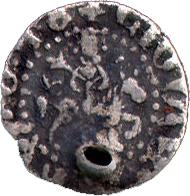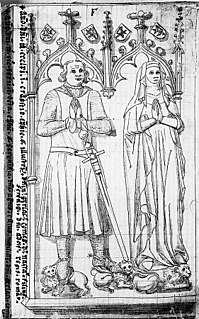Related Research Articles
Prince Narinaga reigned from 1334 to 1338 and was one of two Sei-i Taishōguns during the Kenmu Restoration. He was also Crown Prince in 1336.

Constantine II, , born Guy de Lusignan, was elected the first Latin King of Armenian Cilicia of the Poitiers-Lusignan dynasty, ruling from 1342 until his death in 1344.
Johannes de Muris, or John of Murs, was a French philosopher, astronomer, mathematician, and music theorist best known for treatises on the ars nova, titled Ars nove musice.

Bristol City Council is the local authority of Bristol, England. The council is a unitary authority, and is unusual in the United Kingdom in that its executive function is controlled by a directly elected mayor of Bristol. Bristol has 35 wards, electing a total of 70 councillors.

Gerlach I of Nassau, Count of Nassau in Wiesbaden, Idstein, Weilburg, and Weilnau.
Leopold of Austria may refer to:
Annibale Gaetani di Ceccano was an Italian Cardinal. His palace, the Livrée Ceccano at Avignon, begun in about 1335/1340, still survives; it is now a public library.
John Trilleck or Trillick was a medieval Bishop of Hereford.

Reginald II of Guelders, called "the Black", was Count of Guelders, and from 1339 onwards Duke of Guelders, and Zutphen, in the Low Countries, from 1326 to 1343. He was the son of Reginald I of Guelders and Marguerite of Flanders.

Ivan Nelipić was a local ruler and Duke of Knin, who also held Drniš and the region around the rivers Cetina, Čikola, Krka, and Zrmanja. He was a member of the Croatian Nelipić noble family. Following the fall of the Šubić noble family, Ivan Nelipić seized Knin and successfully repelled attacks from both King Charles I and the Šubić noble family, becoming the most powerful individual in Croatia between 1322 and 1344.
John I, Duke of Mecklenburg-Stargard, Duke of Mecklenburg from 1344 to 1352 and Duke of Mecklenburg-Stargard from 1352 to 1392.
John II, Lord of Werle[-Güstrow] nicknamed The Bald, was from 1309 to 1316 co-regent of Werle and from 1316 to 1337 Lord of Werle-Güstrow. He was the second eldest son of John I of Werle and Sophie of Lindow-Ruppin.
Simon I, Lord of Lippe ruled Lippe from 1273 until his death in 1344.
George II Ghisi was a Latin feudal lord in medieval Greece, lord of Tinos and Mykonos and Triarch of Negroponte.
As-Salih Imad ad-Din Abu'l Fida Isma'il, better known as as-Salih Isma'il, was the Bahri Mamluk sultan of Egypt between June 1342 and August 1345. He was the fourth son of an-Nasir Muhammad to succeed the latter as sultan. His reign saw a level of political stability return to the sultanate. Under his orders or those close to him, his two predecessors and brothers, al-Ashraf Kujuk and an-Nasir Ahmad, were killed. He was succeeded by another brother, al-Kamil Sha'ban.
Kayin Ba was governor of Toungoo (Taungoo) from 1325 to 1342. Prior to his governorship, the commoner had served all the rulers of the frontier state since its creation in 1279, eventually rising to mayor of Toungoo by the 1310s. Taking advantage of the rivalry between King Uzana I and Crown Prince Kyawswa I at Toungoo's overlord Pinya, he seized the governorship in 1325 by assassinating Gov. Saw Hnit. While he remained a nominal vassal of Pinya, Ba ruled the region like a sovereign ruler for the next 17 years, transforming the hitherto minor vassal state into a regional power.

The Admiral of the South also known as Admiral of the Southern Fleet was a senior English Navy appointment. The post holder was chiefly responsible for the command of the navy's fleet that operated in the English Channel out of Portsmouth from 1294 to 1326.

The Tolzey Court was a court with civil jurisdiction that was held in the English city of Bristol. First mentioned in 1344, it may have developed out of the borough hundred court. It was originally held in a room on Corn Street but later moved to the Bristol Guildhall on Broad Street. The court absorbed the Mayor's Court and at least one of Bristol's court of piepowders.
References
- ↑ Williams, W.R. (1898). The parliamentary history of the county of Gloucester.
- ↑ "Mayors and Sheriffs of Bristol 1300 -1399". davenapier. Retrieved 5 July 2021.